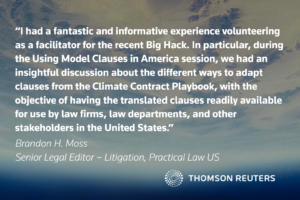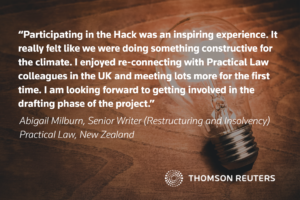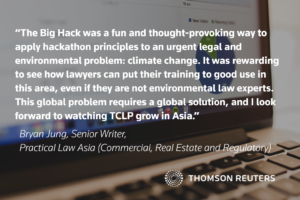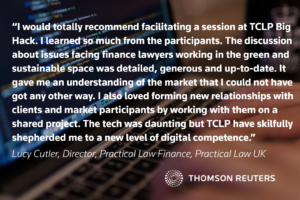Chancery Lane Project: Lawyers Worldwide Collaborate on Climate Change

Hundreds of lawyers around the world participated in The Chancery Lane Project (TCLP), a 24-hour global hackathon to create new contracts and model laws to help fight climate change, earlier this month. Thomson Reuters was honored to sponsor the hackathon, which focused on creating legal frameworks that enable and encourage businesses and communities to have a positive impact on the environment.
Legal Current had an opportunity to catch up with Becky Clissmann, environmental law editor at Practical Law UK and a member of the TLCP steering group, after the hackathon. Below is a recap of the conversation.
Legal Current: This is the second year for the hackathon. How many lawyers participated, and how does this year’s event compare to the inaugural event?
Clissmann: This year we nearly doubled the number of participants taking part in the drafting. Last year we had over 120 lawyers, and this year it was over 200. But what was very special, and what I find so exciting, is that this year, the hackathon was a truly global event. This means we will more than double our impact. TCLP’s model clauses will – following any translation necessary to make them jurisdictionally relevant – be taken up in agreements in multiple jurisdictions including the US, Australia, New Zealand, Ireland and Hong Kong. Once you inspire even a small group of people in different places, the idea catches on and before you know it a new market practice has been formed. Ground-breaking stuff!
LC: How is the hackathon moving the needle in getting lawyers to collaborate on legal solutions that enable business and communities to transition to net zero emissions?
Clissmann: Another really fantastic aspect of this project is that lawyers are coming together from different firms, in-house teams and barristers’ chambers across multiple practice areas and sectors to collaborate. Drafting climate-conscious legal solutions requires a range of expertise, and with over 500 participants signed up on our online Slack community, we really have an amazing breadth of knowledge and experience in so many different areas that we can call on. This allows us to draft innovative and ambitious model clauses that can quickly be refined, peer-reviewed and published.
Also, the hackathon is not just about the content that is written; it’s about empowering and inspiring lawyers to understand that they are the key to helping their clients, or companies, transition to net zero. What they add to an agreement will dictate how transactions are done and how businesses operate. We can all make these changes now; we don’t need to wait for legislation or international treaties to be made. We can all talk to the people we work with and suggest adding this wording to agreements. We can rewire the documents we work with to make them address climate risks and problems.
LC: How are Thomson Reuters content and solutions supporting the legal profession’s efforts to fight climate change?
Clissmann: Aside from sponsoring last year and this year’s hackathon, Thomson Reuters has invested a significant amount of editorial time – over 600 hours in the last year and a half – participating in both hackathons, joining the drafting teams and helping to peer review TCLP’s Climate Contract Playbook containing the model clauses.
However, we have gone one step further: Cathy DiFiglia, vice president of US Practical Law Editorial, and Elizabeth Beastrom, president of Global Print for Thomson Reuters, have committed to incorporating this wording into Practical Law resources. We have already kicked off a project within Practical Law UK to assess how we can do this, and I’m hoping this project will be widened to include other Practical Law jurisdictions very soon.
Practical Law precedents are widely regarded as a gold standard across many practice areas. Our subscribers rely on us to explain and address issues that will affect them and their clients in our resources. By getting involved in this project, we are fulfilling our position as a trusted knowledge provider and helping our subscribers tackle climate change and understand how to transition to net zero. It’s a project where our values – environmental good citizenship – and our skillset – deep knowledge of law and legal precedents – are combining to produce some powerful content.
LC: What’s the one thing you hope all the participants took away from the hackathon?
Clissmann: When you change the precedent, you change the world. I hope the hackathon made participants realize that each of them has an incredible power to affect change in the world and that by working together, we can shift legal market practices quickly and effectively to tackle the climate crisis.
LC: What are other ways legal professionals can support businesses and communities in fighting climate change?
Clissmann: There are many pro bono opportunities where lawyers can help communities, habitats and species affected by the climate crisis. And of course, we can all make changes as consumers in what we buy and how we use, and dispose of, our possessions. What I love about TCLP is that it takes climate action into lawyers’ everyday life. Imagine if everyone involved in this project told five or 10 contacts, not necessarily lawyers, about it and suggested that they use TCLP model clauses in the agreements they were involved with. We would quickly see climate change being addressed in thousands of legal agreements worldwide – that’s a good day’s work!
For more on the history and background of hackathon, listen to Clissmann’s recent podcast on Legal Current.



